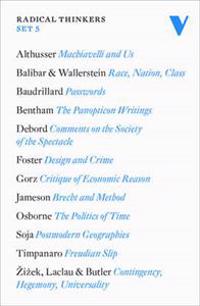Collected Works of Jeremy Bentham: An Introduction to the Principles of Morals and Legislation, The (Pocket)
avJeremy Bentham
ISBN: 9780198205166 - UTGIVEN: 1996-01-11Utilitarianism and Other Essays (Storpocket)
avJeremy Bentham, John Stuart Mill
ISBN: 9780140432725 - UTGIVEN: 198703One of the most important nineteenth-century schools of thought, Utilitarianism propounds the view that the value or rightness of an action rests in how well it promotes the welfare of those affected by it, aiming for 'the greatest happiness of the greatest number'. Jeremy Bentham (1748-1832) was th[...]
An Introduction to the Principles of Morals and Legislation (Häftad)
avJeremy Bentham
ISBN: 9780486454528 - UTGIVEN: 200706The Classical Utilitarians (Häftad)
avJeremy Bentham, John Stuart Mill
ISBN: 9780872206496 - UTGIVEN: 200303This volume includes the complete texts of two of John Stuart Mill's most important works, UTILITARIANISM and ON LIBERTY, and selections from his other writings, including the complete text of his REMARKS ON BENTHAM'S PHILOSOPHY. The selection from Mill's A SYSTEM OF LOGIC is of special relevance to[...]
Handbook of Material Culture (Häftad)
avJeremy Bentham
ISBN: 9781446270561 - UTGIVEN: 2013-03The study of material culture is concerned with the relationship between persons and things in the past and in the present, in urban and industrialized and in small-scale societies across the globe. The Handbook of Material Culture provides a critical survey of the theories, concepts, intellectual d[...]
The Rationale of Punishment (Häftad)
avJeremy Bentham
ISBN: 9781591026273 - UTGIVEN: 2008-07This edition of Jeremy Bentham's "The Rationale of Punishment" is the first comprehensive version of this classic philosophical text since 1830. Editor James T McHugh approaches this important work on penology from a new perspective. Through a careful examination and comparison of original manuscrip[...]
The Panopticon Writings (Inbunden)
avJeremy Bentham
ISBN: 9781844676668 - UTGIVEN: 201012Definitive collection of Bentham's work on the model prison, key to Foucault's theory of power.
Radical Thinkers Set 5 (Häftad)
avJeremy Bentham, Etienne Balibar, Senior Immanuel Wallerstein
ISBN: 9781844676781 - UTGIVEN: 2010-12This shrinkwrapped set contains twelve Verso Radical Thinkers volumes at a discounted price: Machiavelli and Us by Louis Althusser Race, Nation, Class: Ambiguous Identities by Etienne Balibar and Immanuel Wallerstein Passwords by Jean Baudrillard The Panopticon Writings by Jeremy Bentham Comments on[...]
Panopticon : En ny princip för inrättningar där personer (Inbunden)
avJeremy Bentham
ISBN: 9789157804136 - UTGIVEN: 200201Jeremy Bentham (17481832) var en av de mest inflytelserika politiska filosoferna i Europa under 1800-talet och tillhör liberalismens klassiker. Under flera decennier arbetade han med att konstruera ett idealt fängelse, som han kallade panopticon, ett projekt som på senare tid blivit mycket uppmä[...]
Om principerna för moralen och lagstiftningen (Häftad)
avJeremy Bentham
ISBN: 9789174651621 - UTGIVEN: 201101Vad är meningen med livet ?
Jeremy Bentham (1748-1832) ansåg att det var lyckan. Individen gjorde rätt i att sträva efter lycka, och ju fler som blev lyckliga, desto lyckligare blev samhället.
Han uppfann inte satsen ?största möjliga lycka för största möjliga antal?,[...]















